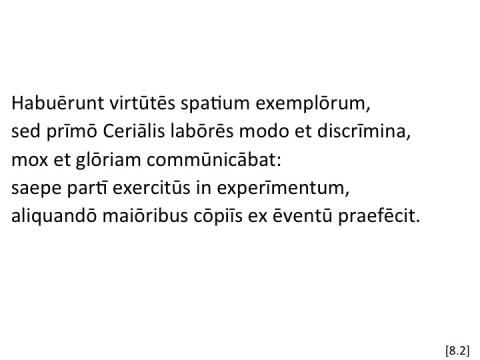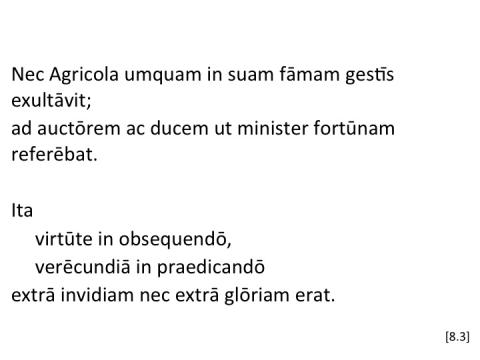Overview: Agricola's deportment toward his superiors was marked by modesty and by a disposition to “render unto Caesar that which was Caesar's.” (Stuart) His valuable qualities as a soldier recognized by Cerialis. (Pearce)
8.1
tunc: in 69 CE Vettius Bolanus had commanded in the East under Corbulo, and, after his governorship of Britain, became proconsul of Asia. (Pearce)
Vettius Bōlānus: had seen service in Armenia as legatus legionis. A characterization of his regime will be found in ch. 16. (Stuart); legatus of a legion under Corbulo, consul suffectus in 67/68 CE, sent by Vitellius as the successor of Trebellius Maximus as governor of Britain, 69-70 CE, and proconsul of Asia Minor in the reign of Vespasian. (Gudeman)
ferōcī: in a good sense, “warlike.” (Stuart) ferōcī prōvinciā dignum: an inversion of the usual sense of dignus. Instead of saying that the province is not deserving of a certain treatment, Tacitus says the treatment is not worthy of, i.e. not adapted to, the province. (Pearce) dignum: “deserves.” (Gudeman)
temperāvit: placed (like praeerat and habuerunt in 8.1) at the beginning of the sentence for the sake of emphasis. See Introd. p. xxvi, #3. Observe the chiasmus. (Gudeman)
compescuit: unclassical for coercuit (Dräger). (Pearce)
incrēsceret: “that he (Agricola) might not rise too high.” (Stuart); some editors emend the unusual word incresceret or supply a subject other than Agricola, such as invidia, "envy." (Damon)
perītus obsequī: the infinitive with adjectives is a frequent usage in post-Augustan prose. (Stuart) [A&G 461]
ērudītusque ... miscēre: a natural analogy from the classical doctus with infinitive. “Taught to reconcile interest with duty.” (Pearce) [A&G 461]
ūtilia honestīs: "the expedient course with the honorable." (Stuart) ūtilia honestīs miscēre: on the simple verb for the compound (admiscere), see ch. 10.4. (Gudeman)
brevī deinde = paulō post, rare. (Gudeman)
cōnsulārem: sc. legatum. Cerealis had previously served in Britain as legatus of the 9th legion under Paulinus. He was one of Vespasian’s most able generals, and was sent by him in 70 CE to suppress the rebellion of Civilis and the Batavi. (Pearce)
Petīlium Ceriālem: Q. Petilius Cerialis Caesius Rufus, commander of the ninth legion, which was routed by the Britains under Boudicca, in 61 CE. Having espoused the cause of Vespasian, his relative, he was consul suffectus in 70 CE and 74 CE. He was sent by Mucianus to Germany, where he put down the formidable uprising of Civilis, in 70 CE. (Gudeman); he was consul in 70 CE and was sent to Britain in 71 CE as legatus provinciae. (Stuart)
8.2
spatium: “a field.” (Stuart) exemplōrum: “exploits” that might serve as models. (Stuart) spatium exemplōrum: "scope for their effective display." (Pearce)
et = etiam, occurs in Tacitus more than 150 times. (Gudeman)
in experīmentum: see note on 5.1, in iactationem. (Pearce); with final sense, "by way of testing him." (Stuart)
ex ēventū: “in consequence of his success.” (Stuart); “as a result of success.” Eventus, properly “the issue,” is used by post-classical writers in the meaning of “a fortunate issue,” see note on 27.2, occāsiōne. (Pearce); eventus, a so-called vocabulum medium, may designate either a good or a bad “outcome.” (Gudeman)
8.3
in suam fāmam: in used as before as in experimentum, ch. 8.2. (Pearce)
gestīs = rebus gestis; rare in Tacitus, as in other writers. (Gudeman)
ad auctōrem: on the adversative asyndeton, see Introd. p. xxviii, #11c. (Gudeman)
fortūnam: Agricola's modest description of what were actually res gestas, "achievements." (Stuart)
ita: introducing, as in chapter 7.3, a concluding sentence which sums up the matter under discussion. (Stuart)
virtūte, etc.: observe the careful balancing of clauses. On the alliterative antithesis and the repetition of the preposition, see note ch. 5.3, ex magnā ... ex mālā, and Introd. p. xxvii, xxviii, #13. (Gudeman)
extrā: in a figurative sense similar to that which lies back of citra, chapter 1.3. (Stuart); = sine, “free from.” (Gudeman)
nec: adversative, “but not.” (Stuart); = nec tamen, “nor for all that.” So, frequently, e.g. ch. 19.3. (Gudeman)



